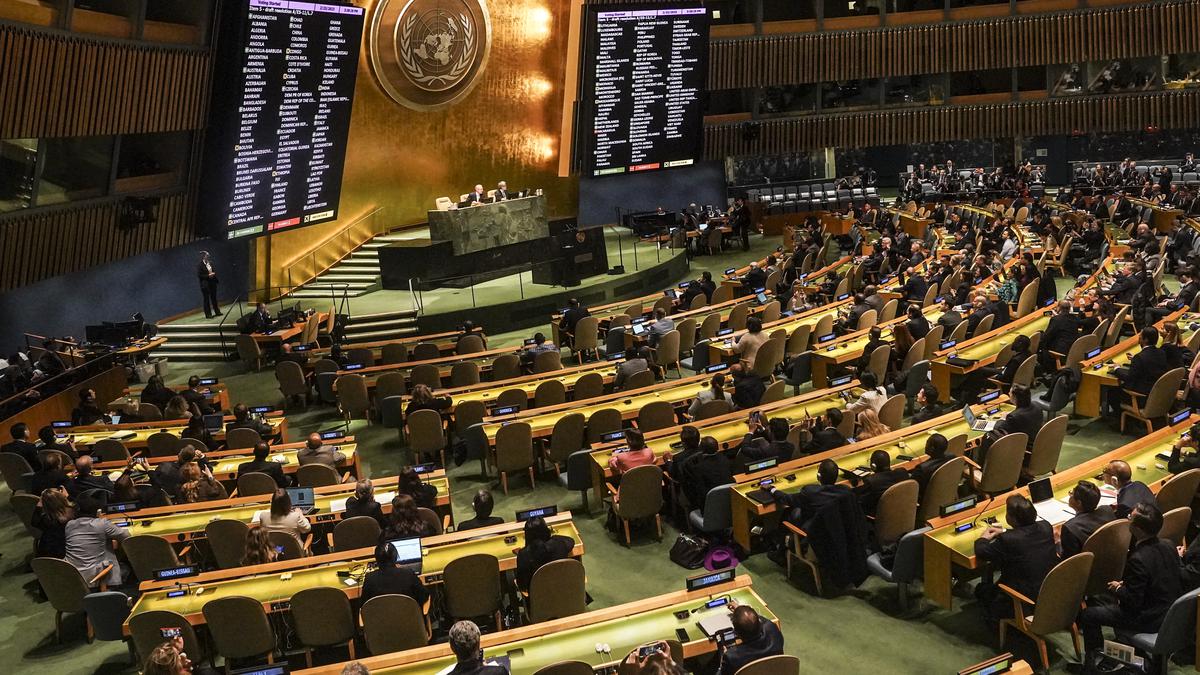India didn’t vote for or against a resolution at the UN General Assembly on Thursday. The resolution stressed the need for a “comprehensive, just, and lasting peace” in Ukraine as soon as possible, in line with the UN Charter.
The 193-member General Assembly passed the “Principles of the United Nations Charter underpinning a comprehensive, just, and lasting peace in Ukraine” resolution. It was put forward by Ukraine and its supporters.
The resolution, which passed with 141 yes votes and 7 no votes, “highlights the need to reach a comprehensive, just, and lasting peace in Ukraine as soon as possible in line with the principles of the UN Charter.” India was one of the 32 nations that didn’t vote.
In line with the Charter, the resolution asked member states and international organisations to help diplomatic efforts to bring about a full, fair, and lasting peace in Ukraine.
It reaffirmed its commitment to the sovereignty, independence, unity, and territorial integrity of Ukraine within its internationally recognised borders, including its territorial waters. It also repeated its demand that Russia immediately, completely, and unconditionally remove all of its military forces from the territory of Ukraine within its internationally recognised borders and calls for an end to hostilities.
In the year since Russia invaded Ukraine on February 24, 2022, the UN General Assembly, Security Council, and Human Rights Council have all passed resolutions condemning the invasion and reiterating their support for Ukraine’s sovereignty, independence, unity, and territorial integrity.
India has not voted on the UN resolutions about Ukraine, and it has always said that the UN Charter, international law, and the sovereignty and territorial integrity of states must be respected.
New Delhi has also asked that all efforts be made to stop fighting right away and get back on the path of dialogue and diplomacy as soon as possible.
In his speech to the high-level UN General Assembly session last September, External Affairs Minister S. Jaishankar said that India is on the side of peace, dialogue, and diplomacy in this conflict.
“As the conflict in Ukraine keeps going on, we are often asked which side we are on. And every time, we give a straight and honest answer. India is and will always be on the side of peace. We’re on the side that follows the UN Charter and its basic ideas. “We are on the side that says dialogue and diplomacy are the only way out,” Jaishankar had said. He had also said that it was in everyone’s best interest to work together, both inside and outside the UN, to find a solution to this conflict as soon as possible.
India has also said over and over that the conflict has caused “substantial collateral damage” to the entire global South, and that food, fuel, and fertiliser supplies are most affected in developing countries.
Jaishankar has said that India is on the side of those who are “struggling to make ends meet, even as they look at the rising costs of food, fuel, and fertilisers.” The UNGA resolution said that the attacks on Ukraine’s critical infrastructure and any intentional attacks on civilian objects, like homes, schools, and hospitals, had to stop right away.
It asked all member states to work together in the spirit of solidarity to deal with the effects of the war on food security, energy, finance, the environment, and nuclear security and safety around the world. It also said that these issues should be taken into account when making plans for a full, fair, and lasting peace in Ukraine.
On Wednesday, when the emergency special session of the General Assembly got back to work, UN Secretary-General Antonio Guterres said that Russia’s invasion of Ukraine is “an affront to our collective conscience” and that it is “high time” to step back from the brink.
“The one-year anniversary of Russia’s invasion of Ukraine is a sad anniversary for both the people of Ukraine and the rest of the world. That invasion hurts our collective sense of right and wrong. It goes against the UN Charter and international law, Guterres said, adding that the invasion is having very bad effects on people’s lives and their rights.
Guterres said in a strong message that the war is making things worse in the region, adding to tensions and divisions around the world, and taking attention and resources away from other crises and important global issues. “In the meantime, we have heard hints that nuclear weapons could be used. The so-called tactical use of nuclear weapons is something that can’t be tolerated at all. “It’s way past time to back away from the edge,” he said.
